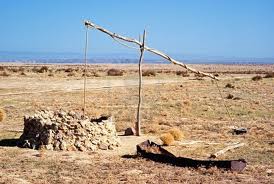Background Passage: Deuteronomy 6:10-12
I came across rather obscure a passage of scripture this week while looking for the focus of my writing. I read it…and moved on, searching for something different. No matter what I read and studied this week, that passage kept invading my thoughts.
In this passage in Deuteronomy, Moses has just wrapped his arms around the stone tablets upon which were etched God’s commands for his people. The list of “thou shalt” and “thou shalt nots” intended as a framework of righteous relationship with the Father and with his people.
Moses reminded them of the great promise of God to Abraham, Isaac and Jacob to give them a land that would belong to them…a land flowing with milk and honey. Then, he encouraged them to claim that promise as their own. The land God promised, according to Moses, held within it everything they needed in life. God would grant them…
“…cities you did not build, good things you did not provide, wells you did not dig, and vineyards and olive groves you did not plant…”
Every time I tried to move away from the passage, I found myself back in Deuteronomy thinking about how the people of Israel would drink from wells they did not dig. Every time I thought about it, I thought about how often I have quenched my thirst for God from wells I did not dig.
I found my first taste of God’s well water from loving parents and a family who made faith a priority. From that little Baptist church in Ropesville where I grew up and a bevy of Sunday School teachers who shared their hearts and souls. From a Baptist Student Union at Texas Tech that served as a cistern of Christian friends who met my needs for fruitful fellowship. From a time serving as a youth minister in Wolfforth where God taught me more than I taught the young people I served.
I drank again from wells I did not dig from a marriage partner whose life is Jesus personified. From children who have matured in their own faith as an encouragement to mine. To a home church in Pasadena with pastors and friends who invested in my life, shaping my witness and my service. To a profession in public education that opened as a calling to help those in need. To a life in which every moment is a testament of God’s grace, forgiveness and purpose.
In each moment, I drank from wells I did not dig. I am grateful for each time I drew water from those wells.
After reminding his people of God’s unmerited gifts that awaited them in the promised land, Moses added a warning.
“…then, when you drink and are satisfied, be careful that you do not forget the Lord who brought you out of Egypt…”
There it is. The reason this passage kept creeping back into my heart. God placed so many people…so many wonderful opportunities…in my life that allowed me to drink and be satisfied. Too often I forget how hard it must have been for those in my life to dig that well. I forget how God’s hand moved in my life so I found every well when when I needed it most.
The living water God promised through his son, Jesus, flowed through the lives of all these people who offered me encouragement, support, discipline, wisdom, hope and love. The clearest, coolest water I have ever had the privilege to drink…and it was all from wells I did not dig.
I sit here today having lived in cities I did not build, enjoying good things I did not produce, drinking for wells I did not dig and eating from vineyards and groves I did not plant. The promised land God gave me.
To all who offered me a taste of their water, thank you. I offer praise to God who provided your shovel and showed you where to dig.

